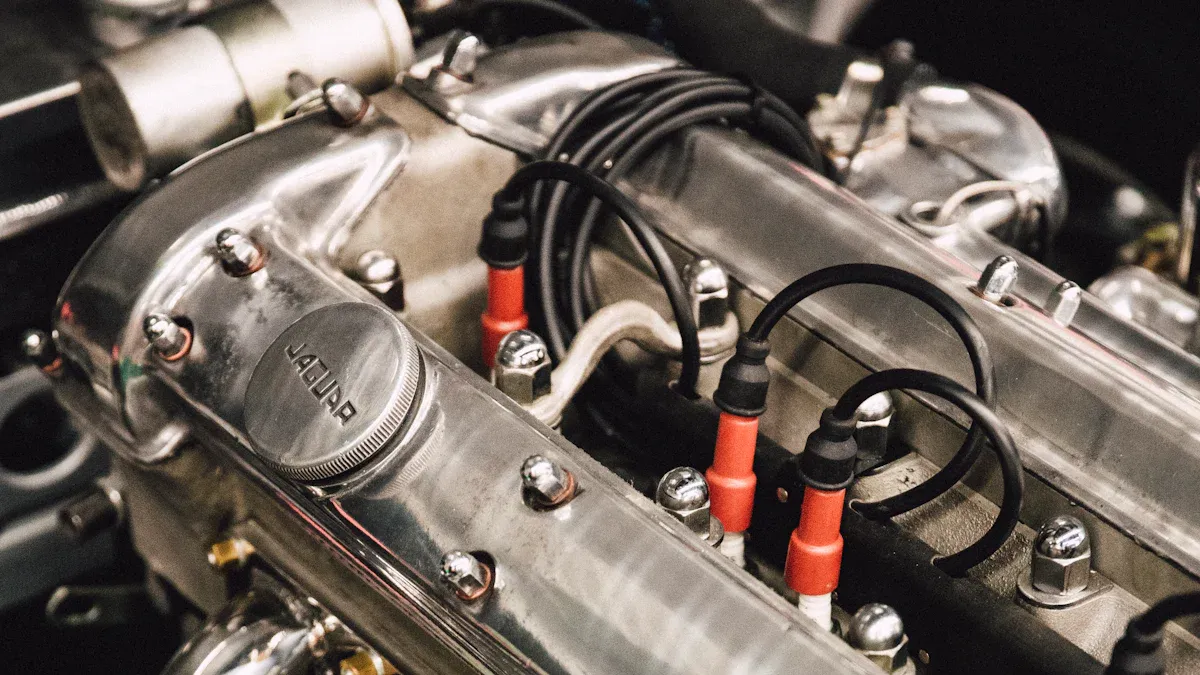
Twin screw barrels play a critical role in plastics and rubber machinery, ensuring smooth and efficient material processing. Proper maintenance and sourcing of spare parts from reliable twin plastic screw barrel factories enhance durability and operational efficiency. Neglecting care for components such as twin parallel screw barrels or conical twin screw twin screws leads to reduced performance and shorter equipment lifespan.
Importance of Maintenance and Sourcing for Twin Screw Barrels
Effects of Wear and Tear on Performance
Wear and tear significantly impact the performance of twin screw barrels. Abrasion, caused by hard particles in polymers, erodes the surfaces of screws and barrels. Corrosive wear, resulting from chemical attacks by additives and degraded polymer particles, leads to pitting and material breakdown. The shearing action during material transport also contributes to abrasive wear on screw flights and barrel walls. Corrosion further accelerates mechanical wear as the metal surface deteriorates. These factors collectively reduce efficiency, increase energy consumption, and shorten the lifespan of the equipment.
Benefits of Sourcing High-Quality Spare Parts
Using high-quality spare parts enhances the performance and durability of twin screw barrels. Superior metallurgical bonding strengthens the connection between coatings and barrels, improving resistance to wear and corrosion. Enhanced durability extends the operational life of the equipment, minimizing downtime. Additionally, cost efficiency is achieved by reducing the frequency of maintenance and replacements.
| Benefit | Description |
|---|---|
| Superior Metallurgical Bonding | Creates a strong bond between the coating and the barrel, enhancing durability. |
| Enhanced Durability | Provides exceptional resistance to wear and corrosion, extending the operational life. |
| Cost Efficiency | Reduces maintenance frequency, leading to significant cost savings over time. |
Financial Impact of Neglecting Maintenance
Neglecting maintenance leads to costly consequences. Worn components increase energy consumption and reduce production efficiency. Frequent breakdowns result in unplanned downtime, disrupting operations and delaying deliveries. Over time, the cost of repairing or replacing severely damaged parts far exceeds the expense of regular maintenance. Proactive care ensures consistent performance and prevents financial losses caused by equipment failure.
Essential Maintenance Practices for Twin Screw Barrels

Cleaning to Prevent Material Buildup
Material buildup inside twin screw barrels can hinder performance and lead to inefficiencies. Regular cleaning prevents residue accumulation and ensures smooth operation. Commercial purging compounds (CPCs) offer an effective solution for cleaning.
- CPCs eliminate resin, color, contamination, and carbon deposits from barrel surfaces.
- Their low affinity for metal enhances cleaning efficiency.
- Thermally stable CPCs prevent oxidation during shutdowns.
- These compounds expand into hard-to-reach areas, removing residual materials thoroughly.
- CPCs cool and shrink, aiding in the removal of stubborn buildup.
Using CPCs is cost-effective compared to traditional cleaning methods, making them a preferred choice for maintaining twin screw barrels.
Lubrication to Reduce Friction and Wear
Lubrication plays a vital role in reducing friction and wear in twin screw barrels. Proper lubrication ensures smooth operation and minimizes mechanical stress. Selecting the right lubricant can significantly lower long-term costs while enhancing operational efficiency.
- Lubrication reduces machine wear, preventing incipient power losses.
- It maintains necessary pumping pressure, ensuring consistent output levels.
- Proper lubrication prevents increased radial clearance, which can lead to leakage flow and reduced throughput.
- It helps avoid higher melt temperatures, reducing the need for increased RPM and energy consumption.
By prioritizing lubrication, operators can extend the lifespan of twin screw barrels and maintain optimal performance.
Monitoring Temperature Settings
Temperature control is crucial for the efficient operation of twin screw barrels. Excessive heat can degrade materials and accelerate wear, while insufficient heat may hinder processing. Operators should monitor temperature settings closely to maintain the ideal range for specific applications.
Using advanced temperature monitoring systems ensures consistent heat distribution and prevents overheating. These systems help operators identify anomalies early, allowing timely adjustments to avoid damage. Proper temperature management enhances material processing and reduces the risk of equipment failure.
Conducting Wear Inspections Regularly
Regular wear inspections are essential for identifying potential issues before they escalate. Operators should examine screw flights, barrel walls, and other critical components for signs of abrasion or corrosion.
Wear inspections help detect early-stage damage, enabling timely interventions. Using precision measuring tools ensures accurate assessments of wear levels. Scheduled inspections reduce the likelihood of unexpected breakdowns, ensuring uninterrupted production.
Timely Replacement of Worn Components
Replacing worn components promptly prevents further damage and maintains operational efficiency. Delaying replacements can lead to increased energy consumption and reduced throughput. Operators should maintain an inventory of critical spare parts to facilitate quick replacements.
Using high-quality spare parts ensures compatibility and durability. OEM parts provide reliable performance and extend the lifespan of twin screw barrels. Timely replacements minimize downtime and prevent costly repairs, contributing to long-term cost savings.
Best Practices for Sourcing Spare Parts for Twin Screw Barrels

Evaluating Supplier Reliability
Choosing a reliable supplier is essential for ensuring the longevity and performance of twin screw barrels. Suppliers with a strong reputation often provide high-quality spare parts that meet industry standards. Evaluating supplier reliability involves several key factors:
- Customer reviews offer valuable insights into the supplier’s reputation. Positive feedback often highlights product durability, ease of operation, and responsive after-sales support.
- Testimonials from industry professionals validate the supplier’s claims about product performance and reliability.
- A comprehensive warranty reflects the supplier’s confidence in their products, while reliable technical support minimizes downtime and operational challenges.
- Easy access to spare parts ensures production continuity, reducing delays caused by sourcing difficulties.
By considering these factors, businesses can select suppliers that align with their operational needs and quality expectations.
Importance of OEM Parts
Original Equipment Manufacturer (OEM) parts play a critical role in maintaining the performance of twin screw barrels. These parts are specifically designed to match the equipment’s specifications, ensuring compatibility and optimal functionality. Research indicates that using OEM parts can reduce wear by up to 50 to 60 percent, as they are tailored to the application and made from the most suitable materials.
OEM parts also enhance wear resistance and extend the lifespan of screws and barrels. Their precise design and material compatibility minimize the risk of mechanical failures, ensuring consistent performance. For example, a Chinese customer maintained a twin screw extruder for nearly 30 years by using OEM parts and routine maintenance. This case underscores the importance of sourcing high-quality, application-specific components to achieve long-term reliability.
Verifying Material Compatibility
Material compatibility is a crucial consideration when sourcing spare parts for twin screw barrels. The screws and barrels must be manufactured from alloys and wear-resistant materials that suit the specific application. Incompatible materials can lead to accelerated wear, reduced efficiency, and frequent breakdowns.
Suppliers should provide detailed information about the materials used in their products. Businesses must ensure that the selected parts meet the operational demands of their machinery. Proper material selection not only enhances performance but also reduces maintenance costs over time.
Maintaining an Inventory of Critical Spare Parts
Maintaining an inventory of critical spare parts is a proactive strategy to minimize downtime. Essential components, such as screws and barrels, should always be readily available to address unexpected breakdowns. This approach ensures that production schedules remain uninterrupted, even during emergencies.
Businesses should prioritize stocking OEM parts to guarantee compatibility and durability. Regularly reviewing inventory levels and replenishing stock as needed prevents delays caused by sourcing challenges. By keeping critical spare parts on hand, operators can maintain the efficiency and reliability of their twin screw barrels.
Operator Training and Documentation for Twin Screw Barrels
Training Operators on Proper Handling
Proper handling of twin screw barrels begins with comprehensive operator training. Skilled operators can prevent unnecessary wear and ensure consistent performance. Training programs should focus on safe handling techniques, such as avoiding excessive force during assembly or disassembly. Operators must also learn to identify early signs of wear, such as unusual vibrations or temperature fluctuations, to address issues promptly.
Hands-on training sessions, combined with theoretical knowledge, enhance operator competence. For example, understanding the impact of improper screw alignment on material flow can help operators avoid costly mistakes. Regular refresher courses ensure that operators stay updated on the latest maintenance practices and equipment advancements.
Keeping Detailed Maintenance Records
Maintaining detailed maintenance records is a proactive strategy to reduce downtime and improve equipment reliability. These records document inspections, repairs, and replacements, enabling operators to identify patterns and predict future maintenance needs. For instance, tracking vibration tests and thermal imaging results can reveal early signs of wear, allowing timely interventions.
A well-organized record-keeping system also facilitates compliance with manufacturer recommendations. By referencing past maintenance activities, operators can schedule preventive measures, minimizing emergency repairs. This approach not only extends the lifespan of twin screw barrels but also ensures uninterrupted production.
Using Manufacturer Guidelines Effectively
Manufacturer guidelines provide valuable insights for maintaining twin screw barrels. These guidelines outline best practices for cleaning, preventive maintenance, and inspection processes. For example:
| Maintenance Tip | Description |
|---|---|
| Regular Cleaning | Removes residues that can hinder performance. |
| Preventive Maintenance | Involves routine checks to prevent excessive wear and maintain efficiency. |
| Inspection Processes | Identifies wear and tear before they escalate into significant issues. |
Operators should also follow specific recommendations, such as maintaining proper gaps between screw threads and barrel surfaces. Regular checks prevent quality issues caused by high melting temperatures. Additionally, adjusting screw speed and power settings based on wear assessments ensures optimal performance. Adhering to these guidelines enhances operational efficiency and reduces long-term costs.
Partnering with Service Providers for Twin Screw Barrels
Advantages of Specialized Maintenance Services
Collaborating with specialized service providers offers significant benefits for maintaining twin screw barrels. These experts possess in-depth knowledge of equipment intricacies, enabling them to address complex issues effectively. Their expertise ensures precision during maintenance tasks, reducing the risk of errors that could compromise performance.
Service providers also bring advanced tools and techniques to the table. For instance, they utilize state-of-the-art diagnostic equipment to identify wear patterns and potential failures. This proactive approach minimizes downtime and extends the lifespan of the equipment. Businesses that partner with specialized providers often experience improved operational efficiency and reduced maintenance costs.
Assistance with Inspections and Repairs
Service providers play a crucial role in conducting thorough inspections and repairs for twin screw barrels. Their methods include advanced techniques such as barrel relining, endoscope inspections, and wear measurements. These services ensure accurate assessments and timely interventions.
| Service Type | Description |
|---|---|
| Barrel Relining | Offers a cost-effective alternative to full replacement, ensuring precision and care in relining. |
| Endoscope Inspections | Provides detailed analysis of barrel condition, enabling early detection of potential issues. |
| Barrel Wear Measurement | Detects wear and tear to prevent costly downtime, providing data for informed maintenance decisions. |
By leveraging these services, businesses can maintain consistent production quality and avoid unexpected breakdowns. Early detection of wear or damage allows operators to address issues before they escalate, ensuring uninterrupted operations.
Expert Advice for Sourcing Spare Parts
Service providers offer valuable guidance when sourcing spare parts for twin screw barrels. Their industry experience helps businesses identify high-quality components that match specific operational requirements. Providers often recommend OEM parts, ensuring compatibility and durability.
Additionally, service providers assist in verifying material compatibility, which is critical for long-term performance. Their insights help businesses avoid costly mistakes, such as using incompatible materials that accelerate wear. By relying on expert advice, operators can make informed decisions, enhancing equipment reliability and efficiency.
Regular maintenance and sourcing quality spare parts are essential for ensuring the optimal performance of twin screw barrels. Proactive care minimizes downtime and extends equipment lifespan. Implementing these practices enhances operational efficiency and reduces long-term costs. Businesses should prioritize these strategies to maintain consistent production and achieve long-term reliability.
FAQ
What are the signs of wear in twin screw barrels?
Operators should look for reduced throughput, increased energy consumption, unusual vibrations, or visible damage to screw flights and barrel walls.
How often should twin screw barrels undergo maintenance?
Regular maintenance should occur every 1,000 to 2,000 operating hours, depending on usage intensity and material abrasiveness.
Can non-OEM parts be used for replacements?
Non-OEM parts may fit but often lack the precision and durability of OEM components, leading to reduced performance and increased wear.
Post time: May-24-2025
